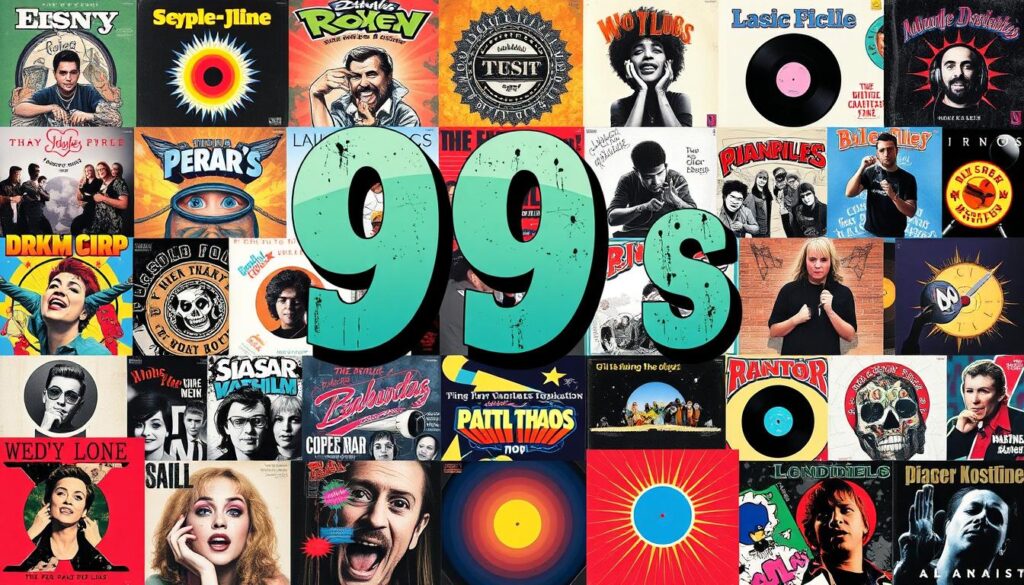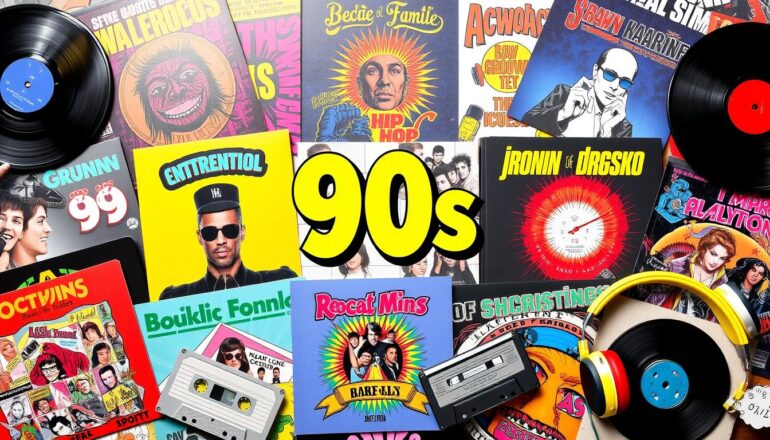The 1990s was a transformative period in music, marked by an explosion of diverse sounds and cultural shifts that shaped the landscape for years to come. As you explore the best albums of the 90s, you’ll unveil not just collections of songs but also cultural artifacts that resonated with listeners and defined the generation. From the grunge revolution spearheaded by iconic albums like Nirvana’s “Nevermind” to the rise of alternative rock with bands like Red Hot Chili Peppers and Green Day, these records explored a range of themes that gave voice to both personal and social struggles.
Throughout the decade, notable trends emerged: hip-hop surged into mainstream consciousness, thanks in large part to artists and albums that pushed boundaries and addressed topics that spanned from the personal to the political. You’ll discover how Aaliyah’s “One In A Million” transformed female R&B vocals while Dr. Dre’s “The Chronic” laid the foundation for G-Funk, a genre that would define West Coast hip-hop. The popularization of Britpop with the likes of Oasis further highlights an era when music was a vital expression of cultural identity.
Additionally, the emergence of MTV as a cultural force changed how artists connected with fans. This filmic representation of music played a significant role in propelling albums into the stratosphere, making music videos as memorable as the songs themselves. As we dive into the iconic 90s albums, you’ll not only see how they revolutionized the music industry but also the enduring legacy they left behind, influencing countless artists and genres that followed.
The Musical Landscape of the 90s
The 90s music scene was a dynamic melting pot, showcasing a vibrant genre evolution that defined the decade. Various styles emerged, each reflecting the cultural shifts of the era. From grunge anthems to hip-hop hits, influential 90s albums created a rich tapestry of sound that resonates even today. Artists like Nirvana and Dr. Dre led the charge, influencing generations of musicians while pushing the boundaries of their respective genres.
Genre Evolution and Pioneering Sounds
The 90s marked a pivotal period in musical history, where genre evolution played a crucial role in shaping modern music. The rise of grunge brought forth bands like Nirvana and Pearl Jam, while hip-hop flourished with artists such as The Notorious B.I.G. and Dr. Dre. Each genre carved out its identity, blending various styles to create fresh sounds that would go on to inspire future artists. Albums like “Automatic for the People” by R.E.M. and “Loveless” by My Bloody Valentine emerged, showcasing the unique creativity that defined the 90s.
Impact of MTV and Pop Culture
The MTV impact transformed the music landscape, changing the way fans engaged with artists. Music videos became essential tools for promotion, offering a visual interpretation of songs. Iconic moments from shows like “Total Request Live” showcased the rising stars of the time and solidified the relationship between music and visual storytelling. This marriage of 90s pop culture with music television turned influential 90s albums into cultural landmarks, resonating deeply with the youth of the decade.
| Genre | Key Artists | Influential Albums |
|---|---|---|
| Grunge | Nirvana, Pearl Jam | Nirvana – “Nevermind” |
| Hip-Hop | Dr. Dre, The Notorious B.I.G. | Dr. Dre – “The Chronic” |
| Alternative Rock | R.E.M., Radiohead | Radiohead – “OK Computer” |
| Shoegaze | My Bloody Valentine | My Bloody Valentine – “Loveless” |
Best Albums of the 90s
The 1990s produced some of the most transformative music albums that undeniably shaped the soundscape of the decade. Among the standout recordings, certain titles emerged as monumental references, defined by their emotional depth and cultural impact. Let’s explore three of the best albums of the decade, each representing a unique facet of 90s music.
Nirvana – Nevermind: The Grunge Revolution
Nirvana’s *Nevermind* is synonymous with the grunge movement, bringing alternative rock into the mainstream consciousness. Released in 1991, its raw energy and lyrics resonated with disillusioned youths, capturing their sentiments perfectly. The album’s iconic tracks, such as “Smells Like Teen Spirit,” have sold over 30 million copies globally, marking it as one of the top 90s albums. The influence of *Nevermind* extended beyond its era, inspiring countless artists and shaping the direction of rock music.
Radiohead – OK Computer: A Dystopian Masterpiece
Emerging in 1997, Radiohead’s *OK Computer* offered a stark contrast to the conventional sounds of its time. This album delved deeply into themes of alienation, consumerism, and technology, presenting a haunting yet beautifully complex soundscape. Tracks like “Paranoid Android” and “Karma Police” showcased the band’s innovative approach and willingness to challenge musical boundaries, ensuring its place among the best albums of the decade. The critical acclaim received by *OK Computer* influenced future generations of musicians and listeners alike.
Alanis Morissette – Jagged Little Pill: Empowering Female Voice
Alanis Morissette’s *Jagged Little Pill*, released in 1995, broke significant barriers for female artists in rock. With her bold and unapologetic lyrics, she gave voice to the emotions and experiences of women navigating a challenging world. Hits like “You Oughta Know” and “Ironic” resonate with personal narratives that evoke deep emotional responses, enhancing its reputation as one of the top 90s albums. This record not only exemplified the spirit of the time but also earned Morissette multiple awards, solidifying her legacy as a significant figure in the music industry.

Iconic 90s Albums and Their Cultural Significance
Several influential 90s albums emerged during the decade, deeply intertwining with various cultural movements. These albums not only showcased unique sounds but also shaped the landscape of music and society at large. The following highlights explore the cultural significance of key albums that defined the era.
Pearl Jam – Ten: Defining Seattle Sound
Pearl Jam’s *Ten* marked a pivotal moment for rock music, firmly establishing the Seattle sound that characterized the grunge movement. Released in 1991, the album featured powerful lyrics and an intense sound that resonated with disaffected youth. Hits like “Alive” and “Jeremy” became anthems for a generation, reflecting the raw emotions and struggles of young people in the early 90s. Its influence remains significant, contributing to the cultural narrative surrounding 90s music.
Dr. Dre – The Chronic: The Birth of G-Funk
Released in 1992, Dr. Dre’s *The Chronic* redefined hip-hop with its smooth G-Funk style, characterized by laid-back rhythms and rich synthesizer melodies. The album introduced artists such as Snoop Dogg to mainstream audiences, shaping the sound of West Coast hip-hop for years to come. Tracks like “Nuthin’ but a ‘G’ Thang” showcased Dre’s production prowess, laying a blueprint that still influences contemporary artists. This album’s cultural significance extends beyond music, impacting fashion, lifestyle, and attitudes in urban communities.
Oasis – (What’s the Story) Morning Glory?: Britpop Phenomenon
Oasis’s *(What’s the Story) Morning Glory?*, released in 1995, encapsulated the spirit of the Britpop era and became a defining album of 90s music. With hits such as “Wonderwall” and “Don’t Look Back in Anger,” this album not only dominated charts but also resonated with the zeitgeist of British youth. The songwriting ability of Noel Gallagher set a benchmark for a generation, and the album’s blend of rock and lyrical storytelling contributed significantly to the cultural significance of 90s music.
| Album | Artist | Release Year | Cultural Impact |
|---|---|---|---|
| Pearl Jam – Ten | Pearl Jam | 1991 | Defined the Seattle sound and grunge movement |
| Dr. Dre – The Chronic | Dr. Dre | 1992 | Introduced G-Funk and reshaped West Coast hip-hop |
| Oasis – (What’s the Story) Morning Glory? | Oasis | 1995 | Captured the essence of Britpop and youth culture |
Influential Concepts in 90s Music Culture
The 90s music culture created a dynamic landscape, characterized by distinct cultural movements that shaped the decade. Within this period, you encounter the notable rivalry and contrasting themes of grunge vs. Britpop, as well as the explosive rise of hip-hop, highlighted by transformative figures like the Notorious B.I.G. and Tupac Shakur. These movements brought a wealth of creativity and cultural dialogue, influencing both artists and fans alike.
Grunge vs. Britpop: A Cultural Divide
Grunge emerged from the Pacific Northwest, encapsulating themes of angst and authenticity. Bands like Nirvana and Pearl Jam represented this raw emotionality, resonating with listeners yearning for sincerity in music. In contrast, Britpop rose as a celebratory response to the 90s music scene. Groups such as Oasis and Blur infused their sound with a sense of national pride and upbeat melodies, creating a distinctly British musical identity. This cultural divide fueled debates about musical authenticity and the direction of popular music during the decade.
Hip-Hop’s Surge: The Notorious B.I.G. and Tupac Shakur
The 90s marked a significant surge in hip-hop, primarily driven by influential artists such as the Notorious B.I.G. and Tupac Shakur. These two figures not only pushed musical boundaries but also explored social and cultural issues through their poignant lyrics. The storytelling aspects of their music resonated with a broad audience, reflecting the struggles and realities of urban life. As each artist carved out their legacy, their rivalry encapsulated key tensions within the genre, making hip-hop an integral part of the cultural movements of the 90s.

Top Tracks from the Best Albums of the 90s
The 90s were a vibrant decade for music, producing numerous iconic tracks that have left a lasting impression on the landscape of popular music. Each album produced standout songs that defined genres and impacted listeners across the globe. Among these, three albums truly showcased the diversity and innovation of the era.
Soundgarden – Superunknown: Heavy Grunge Anthems
Soundgarden’s *Superunknown* represented the peak of the grunge movement, characterized by heavy riffs and powerful lyrics. Tracks like “Black Hole Sun” and “Spoonman” resonate with the angst of the time. These songs stand among the best 90s songs, capturing the darker themes and raw emotion that defined the genre.
R.E.M. – Automatic for the People: Melancholic Anthems
*Automatic for the People* by R.E.M. offered an introspective sound, immersing listeners in themes of loss and reflection. With memorable tracks like “Everybody Hurts” and “Nightswimming,” the album became anthems for those seeking solace in music. This work exemplifies the band’s contribution to the top tracks of the decade, cementing their place in 90s musical history.
Beck – Odelay: Genre-Blending Innovation
Beck’s *Odelay* brought a refreshing fusion of styles, intertwining rock, hip-hop, and electronic influences. Songs like “Loser” and “Where It’s At” showcased his eclectic approach, making it one of the defining albums of the decade. The innovation present in *Odelay* highlights why it stands out among the best 90s songs, further expanding the boundaries of what music could achieve.
| Album | Artist | Top Track | Year | Impact |
|---|---|---|---|---|
| Superunknown | Soundgarden | Black Hole Sun | 1994 | Defined grunge sound |
| Automatic for the People | R.E.M. | Nightswimming | 1992 | Emotional resonance |
| Odelay | Beck | Loser | 1994 | Genre innovation |
Conclusion
The best albums of the 90s encapsulate a decade marked by artistic innovation and cultural evolution. Your journey through these iconic records reveals a vibrant musical landscape, where genres like grunge, hip-hop, and Britpop thrived, each contributing to a remarkable tapestry of 90s music. The breadth of creativity is evident in the revolutionary works of artists like Alanis Morissette and Radiohead, whose albums have not only shaped the decade but continue to inspire new generations.
As you explore the diverse range of albums that defined the 90s, from the introspective sounds of Mazzy Star to the electrifying beats of Daft Punk, you’ll unearth the powerful messages that reflect the societal changes of that era. Not only do these albums resonate with nostalgia, but they also capture the spirit of transformation, making them essential listening for anyone looking to understand the cultural significance of the music that shaped the decade.
Ultimately, the albums that shaped the decade continue to influence contemporary artists, proving the lasting impact of the best albums of the 90s. Delving into this rich musical heritage allows you to appreciate the innovation and artistry that flourished during this transformative time, solidifying the 90s as a cornerstone in the evolution of music history.
- Top 10 Rap Albums That Changed the Game Forever - December 19, 2024
- The Impact of Music Streaming on Artist Revenue - December 19, 2024
- Comparing Digital Music Formats – MP3 vs FLAC vs WAV - December 18, 2024


